Book publishing shocker: That boy didn’t actually come back from heaven!

The secular world is having a good guffaw over the embarrassment of Tyndale House, a Christian book publisher that announced last week it was withdrawing from print its bestseller “The Boy Who Came Back From Heaven.”
The reason: The book’s co-author Alex Malarkey, the “boy” of the title, has admitted that he did not die or go and come back from heaven. The book, co-written with his father, Kevin, and marketed as “a true story,” purports to relate what happened after Alex suffered a car crash at the age of 6 that has left him a quadriplegic. On the Christian blog Pulpit and Pen, Alex, now 16, writes, “I said I went to heaven because I thought it would get me attention.” Tyndale seems to have dropped the book down the memory hole; on Wednesday, I couldn’t find a single mention of it on the firm’s website.
The reaction of the typically rationalist reader to this development is: “What kind of suckers would take a yarn like this seriously in the first place?” Or: “What evidence does it take to persuade a publisher that the story of a trip to heaven is a fabrication?”
Yet the phenomenon of “heaven tourism” books such as “The Boy Who Came Back” deserves a closer look, and perhaps less ridicule. (The term was coined by Christian blogger Tim Challies, who dismisses the genre as “paganism in the guise of Christianity” and “New Age, sub-Christian nonsense.”) Many of these books are enormous bestsellers. The king of the heaven shelf at the moment is “Heaven Is for Real,” by Todd Burpo, which tells how Burpo’s son, Colton, supposedly visited heaven while undergoing an appendectomy at age 4. The book has sold more than 10 million copies since its 2010 publication. A movie version was released last year.
Books like these tend to share several elements. There are detailed descriptions of heaven, sometimes including angels with wings and Jesus and Mary in the flesh. They incorporate many features of “near-death experiences” recounted by accident victims or surgical patients, such as out-of-body experiences and the sensation of beckoning lights and tunnels. The return from heaven, of course, is spiritually satisfying and comforting to the traveler’s family, surely a consolation to readers working through their own feelings of grief and loss.
Challies is not the only Christian skeptic about the genre: On the blog “Grace to You,” evangelical writer Phil Johnson argues that the very idea of anyone coming back from heaven contradicts Scripture, which treats heaven as a final destination. He has little respect for the genre’s readership and no use at all for publishers who pander to it: “Evangelical readers’ discernment skills are at an all-time low,” he writes, “and that is why books like these proliferate. Despite the high profile, high sales figures, and high dollar amounts Christian publishers can milk from a trend such as this, it doesn’t bode well for the future of Christian publishing—or for the future of the evangelical movement.”
The most interesting analysis of the trend and by no means an unsympathetic one was offered last year by Robert Gottlieb in, of all places, the New York Review of Books. Gottlieb, a former editor in chief at Simon & Schuster, Knopf and the New Yorker, reviewed a dozen such books and implies that what makes many of them seem ridiculous isn’t so much their content but their marketing, which is often shameless.
“Heaven Is for Real,” Gottlieb observes, is “slickly told and efficiently exploited,” but doesn’t provide an easy answer to the question of whether the Burpos are sincere or a fraud. “Despite all the commercialization,” he writes, “I believe that they believe that little Colton said things he thought to be true and that were shaped into this artful narrative by an astute collaborator.” The collaborator is Lynn Vincent, who also collaborated on Sarah Palin’s memoir, “Going Rogue.”
Gottlieb places the heaven tourism genre in the context of the literature of the near-death experience, which has been encountered over the years by such eminences as Elisabeth Kubler-Ross of five stages of grief fame; Gen. William Booth, who emerged from one such experience to found the Salvation Army at Jesus’ command; Carl Jung; Fyodor Dostoevsky--and according to their own claims, Elizabeth Taylor, Chevy Chase and Burt Reynolds.
There’s no doubt that the field of heaven tourism and near-death experience is populated by charlatans and frauds. Alex Malarkey and his mother, Beth, have been trying to get his book withdrawn for two years, despite his father’s resistance. It’s not uncommon for authors and purported heaven travelers to have more than a few dodgy elements in their resumes.
Still, while some of the books are more ludicrous than others, Gottlieb judges most to be “clearly sincere, and a number of them... cogent and convincing.” He accepts that many “represent a reality the author experienced and remembered.”
Perhaps more important from the publishing industry’s viewpoint, they deliver “a message mankind has always been happy to receive: You can go on living after you die—in the short run, by returning from death or near-death; in the long run, up in heaven. In fact, once you get to heaven it’s so wonderful there you don’t want to return.”
What’s most intriguing is the nexus between the heaven tourism bookshelf and the findings of science that the visions and sensations of the near-death experience are manifestations of identifiable neurological events. They may not prove the existence of heaven, but they may validate the sincerity of those who report their visits.
“Hallucinations, whether revelatory or banal, are not of supernatural origin; they are part of the normal range of human consciousness and experience,” Oliver Sacks wrote in 2012. “Yet while it is understandable that one might attribute value, ground beliefs, or construct narratives from them, hallucinations cannot provide evidence for the existence of any metaphysical beings or places. They provide evidence only of the brain’s power to create them.”
Keep up to date with the Economy Hub. Follow @hiltzikm on Twitter, see our Facebook page, or email mhiltzik@latimes.com.
More to Read
Start your day right
Sign up for Essential California for news, features and recommendations from the L.A. Times and beyond in your inbox six days a week.
You may occasionally receive promotional content from the Los Angeles Times.







